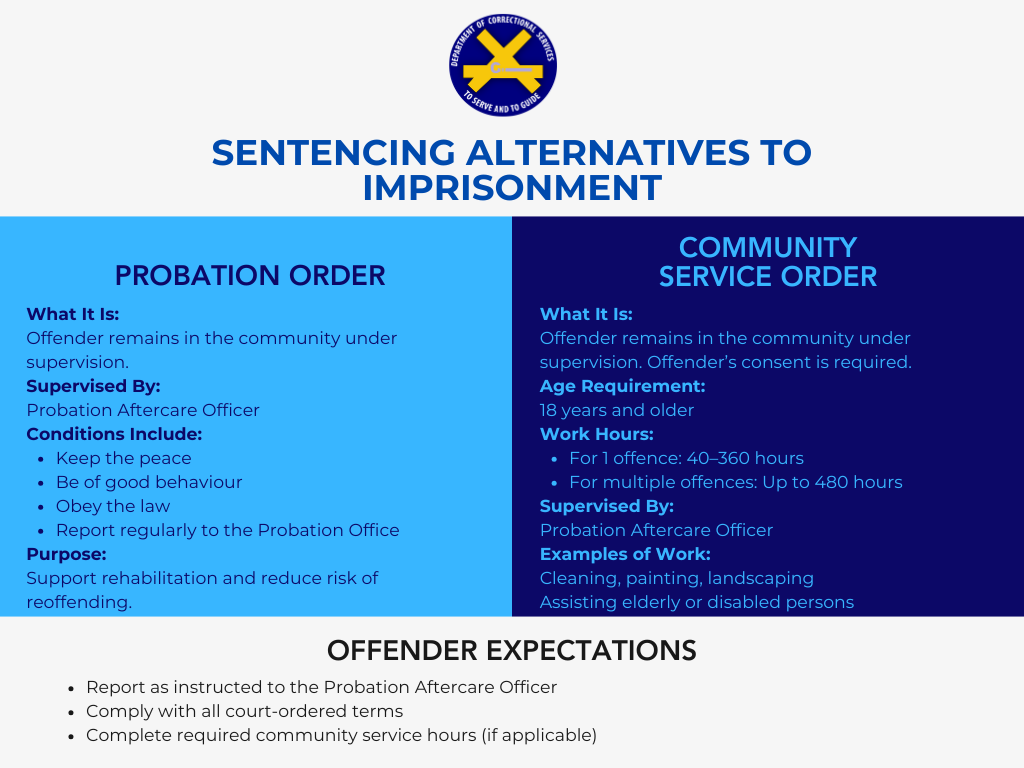

The Criminal Justice System in Jamaica provides for alternative sentencing for offenders aged 18 to under 23 years who have been convicted of an offence. These non-custodial sentences offer a chance for rehabilitation outside of prison, except in cases where:
The Court determines that imprisonment is the only suitable punishment;
The offence carries a mandatory sentence as prescribed by law;
Violence or threats of violence were involved in the offence; or
The offender was in possession of an illegal firearm or imitation firearm at the time of the offence.
The Court may impose a fine as an alternative to imprisonment, except in cases requiring a mandatory custodial sentence. The Court may permit the fine to be paid in instalments or allow time for full payment. Failure to pay any instalment may result in imprisonment.
A Court may issue a suspended sentence for a term not exceeding three years, allowing the offender to serve the sentence in the community without supervision. This applies only to offenders aged 18 or older. A “Bound Over” order, which differs from a suspended sentence, is a conditional release requiring the offender to maintain good behaviour, with the possibility of sentencing if they reoffend within three years.
Offenders aged 18 years or older who receive suspended sentences may be placed under a Suspended Sentence Supervision Order, where they are supervised by a Probation Aftercare Officer. This supervision may last for the duration of the suspended sentence, up to a maximum of three years.
Individuals on suspended sentence supervision are expected to:
Maintain a place of residence;
Remain in regular contact with the Probation Office;
Receive advice and counselling from a Probation Aftercare Officer;
Be subject to monitoring during the supervision period.
These community sentencing options aim to reduce recidivism by promoting rehabilitation and reintegration, while still holding offenders accountable for their actions.
In Jamaica, the Criminal Justice System provides a range of non-custodial sentencing options for eligible offenders. These measures aim to rehabilitate individuals within the community while ensuring accountability and lawful conduct.
A person may be admonished and discharged by the Court. This means the Judge issues a stern warning, and the individual is formally discharged without further penalty. This is typically used for minor offences or first-time offenders.
Under a Probation Order, the offender remains in the community under the supervision of a Probation Aftercare Officer and must adhere to specific conditions, including:
Keeping the peace
Being of good behaviour
Obeying the law
Reporting regularly to a Probation Office
This order aims to support the offender’s rehabilitation and reintegration, while reducing the likelihood of reoffending.
The Court may, with the offender’s consent, impose a Community Service Order on individuals aged 18 or over. This requires the offender to perform unpaid work for:
A minimum of 40 hours and a maximum of 360 hours for a single offence
Up to 480 hours for multiple offences
The offender must:
Report to a Probation Aftercare Officer as instructed
Complete the specified hours of community service
Comply with the terms set out by the Court
The Probation Aftercare Officer provides guidance and ensures that:
Community service assignments do not conflict with the offender’s religious beliefs
Tasks do not interfere with employment or education
The order is effectively monitored and managed
Failure to comply with a Community Service Order may result in:
A fine
The continuation of the order under stricter terms
Revocation of the order and imprisonment
Community Service Orders are not available to offenders who:
Have committed murder
Have used or threatened violence
Possess or use an illegal firearm or imitation firearm
Lack a fixed place of residence